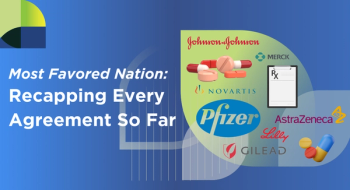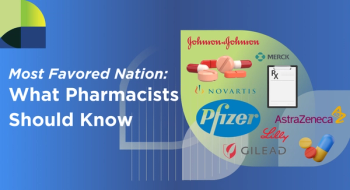
AJPB® Translating Evidence-Based Research Into Value-Based Decisions®
- AJPB November 2020
- Volume 1
- Issue 1
The Importance of Provider Status for Pharmacists
Throughout the pandemic, pharmacists have played a critical role in the COVID-19 response in several ways
Throughout the coronavirus disease 2019 (COVID-19) global pandemic, we have—rightly —seen an outpouring of support for frontline workers risking their lives for the benefit of others. Companies, schools, and community organizations have offered support through donations and free services. In New York and cities around the world, residents regularly cheered their
Pharmacists have been central health care heroes in the frontline fight against the spread of COVID-19. Throughout the pandemic, pharmacists have played a critical role in the COVID-19 response in several ways. These efforts include standing up mobile testing facilities, working alongside their colleagues to draft protocols and response plans, reinforcing messages about how to control the spread in their communities, providing curbside delivery, conducting virtual consultations, and compounding hand sanitizers.
Because they are trusted by patients, readily accessible in most American communities, and are highly skilled, pharmacists are vital to our COVID-19 recovery. However, unlike their acute and physician office counterparts, pharmacists’ legal capacity to assess, prescribe, and administer biological products varies from state to state.
For example, although pharmacists in all 50 states, Washington, DC, and Puerto Rico are permitted to administer vaccines,
To effectively respond to COVID-19, our country is being asked to use all available health care resources to the fullest, which is why there has never been a better, or more important time, to grant provider status to pharmacists.
Fully leveraging pharmacists in COVID-19 response efforts
The Department of Health and Human Services (HHS) has
In addition to vaccine administration, pharmacists can also help to relieve the strain on resources COVID-19 has caused if they are leveraged more fully. To preserve scarce hospital and acute setting resources,
A list of
Ensuring that patients can access testing, vaccines and necessary care will be critical to public health. Unfortunately, a physician shortage was already in place prior to the start of the pandemic, a situation that has only become exacerbated by providers becoming infected with COVID-19 and/or an increasing caseload.
According to the American Association of Medical Colleges 2019 report, there is currently a shortage of nearly
The National Center for Biotechnology Information states approximately 20% of the US population, more than 50 million people, live in rural areas whereas only 9% of the nation’s primary care physicians practice in these communities. Pharmacists are uniquely positioned to help address this need. Ninety percent of Americans live within 5 miles of a pharmacy and, through the use of telepharmacy, pharmacists can deliver care remotely to medically underserved areas.
The urgent need for provider status
Although pharmacists are valued community health care providers and their ability to improve outcomes as part of a patient’s care team has been proven, as of October 2020, only
As was the case in past public US health emergencies, such as the H1N1 outbreak and Hurricane Katrina, pharmacies often experience financial burdens resulting from their response operations. In its 2017 report on public health and community partnerships, the Johns Hopkins Center for Health Security noted that some pharmacies historically have been unable to obtain reimbursement from payers for emergency services provided outside of their normal authorized scope of practice. If pharmacists are permitted to order and administer COVID-19 vaccinations, per the recent HHS guidance, they must also be permitted to make claims.
Additionally, the ability for pharmacists to participate in COVID-19 relief efforts varies widely across the country, because legal scopes of practice (SOP) vary. Before a pharmacist can legally provide services, their state must first authorize these services under its legal SOP. If they are granted Medicare Part B provider status, more pharmacists would be authorized to provide patients with an expanded set of services, reducing the current burden on other sites of care.
Currently, there are more than 40 pending pieces of legislation pertaining to provider status and the level of integration pharmacists should experience in the field. These range from bills about the prescription of hormonal contraceptives to the administering of COVID-19 injectable medications. Nonetheless, pharmacists were ostracized from the HEALS Act, the Senate’s $1 trillion coronavirus stimulus legislative package, excluding them from the expansion of testing and immunization.
A statement was issued by Scott J. Knoer, executive vice president and chief executive officer of the American Pharmacists Association proclaiming that, “Now is the time for an all-in push for the inclusion of temporary pharmacist provider status in Medicare Part B.” And he is
At present, the National Association of Chain Drug Stores, the American Public Health Association, the National Community Pharmacists Association, and numerous other organizations are all working toward this common goal: to encourage realization of the viability of pharmacists as qualified providers.
The success of the eventual distribution and uptake of the COVID-19 vaccine with depend on the seamless coordination of manufacturing, delivery, and administration across all states and territories. Ensuring pharmacists are equipped and able to be adequately reimbursed for their services prior to the release of the vaccine will be vital to this process, especially to ensuring that rural and vulnerable populations have access to the vaccine.
Pharmacists are already an integral part of the US health care system, providing invaluable guidance to their patients and advocating on their behalf, improving patient outcomes, improving efficiency, and reducing the cost of care. During this public health care crisis, pharmacists’ position as accessible and trusted community health providers will be vital to the success of our COVID-19 response and immunization effort.
In order to fully realize the potential of pharmacists to fill in gaps in care, address underserved populations, and relieve a health care system straining for resources, the time to grant pharmacists provider status is now.
Articles in this issue
about 5 years ago
Patient Assistance Programs: The Good, the Bad, and the Uglyabout 5 years ago
Lessons Learned From Kickbacks in the Pharmacy ArenaNewsletter
Stay informed on drug updates, treatment guidelines, and pharmacy practice trends—subscribe to Pharmacy Times for weekly clinical insights.


























